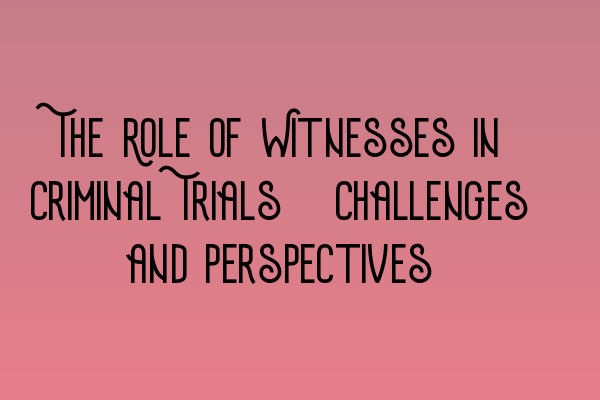The Role of Witnesses in Criminal Trials: Challenges and Perspectives
In criminal trials, witnesses play a crucial role in the pursuit of justice. Their testimonies can make or break a case, providing key evidence that helps determine the guilt or innocence of the accused. However, the role of witnesses in criminal trials is not without its challenges and perspectives.
Importance of Witnesses
Witnesses provide firsthand accounts of events and occurrences that are relevant to a criminal case. Their testimonies can shed light on the sequence of events, the actions of the accused, and any other pertinent information that helps establish the truth. Without witnesses, it would be extremely difficult for prosecutors and defense attorneys to present a strong case.
In the criminal justice system, witnesses serve as the eyes and ears of the court. Their credibility and reliability are crucial factors in determining the weight given to their testimonies. Judges and juries carefully evaluate the demeanor, consistency, and clarity of witness statements to assess their veracity.
Challenges Faced by Witnesses
Witnesses often face several challenges when participating in criminal trials. One common challenge is fear or intimidation. Witnesses may be hesitant to come forward due to concerns about their safety or potential retaliation. This can be a significant hurdle, as it may result in witnesses withholding critical information or refusing to testify altogether.
Another challenge is the pressure of cross-examination. Defense attorneys may aggressively question witnesses to uncover inconsistencies or raise doubts about their testimonies. This can be especially daunting for witnesses who are not well-prepared or lack confidence in their communication skills. Moreover, witnesses may feel overwhelmed by the courtroom environment and the formalities of the trial process.
Additionally, witnesses may struggle to recall events accurately, particularly if the incident happened a long time ago or if they were under stress or trauma at the time. Memory is a complex cognitive process, and certain factors, such as leading questions or suggestive interviewing techniques, can influence the accuracy of witness testimonies.
Perspectives on Witness Testimony
While witnesses play a crucial role in criminal trials, it is essential to recognize that their testimonies are not infallible. Numerous studies have highlighted the limitations and vulnerabilities of witness testimony. Factors such as memory distortion, retrieval errors, and biases can affect the accuracy of witness statements.
Despite these challenges, witness testimony remains a valuable source of evidence. It is the responsibility of the legal system to ensure that witnesses are treated with respect, provided appropriate support, and given the tools necessary to provide accurate and reliable testimonies. This includes sensitivity to cultural and language barriers, as well as providing witness protection programs for those who fear retribution.
To address the challenges faced by witnesses, the legal profession must continue to invest in research and training programs that enhance the understanding and utilization of witness testimonies. This includes educating lawyers on effective questioning techniques, recognizing the impact of trauma on memory, and implementing best practices for witness preparation.
Conclusion
The role of witnesses in criminal trials is of utmost importance. They provide essential information that helps ensure a fair and just determination of guilt or innocence. However, witnesses also face numerous challenges, from fear and intimidation to the fallibility of memory. It is our collective responsibility to support witnesses, recognize their perspectives, and continually strive to improve the quality and reliability of witness testimonies in criminal trials.
For more information on criminal law and practice, and to explore related topics, feel free to visit our website:
